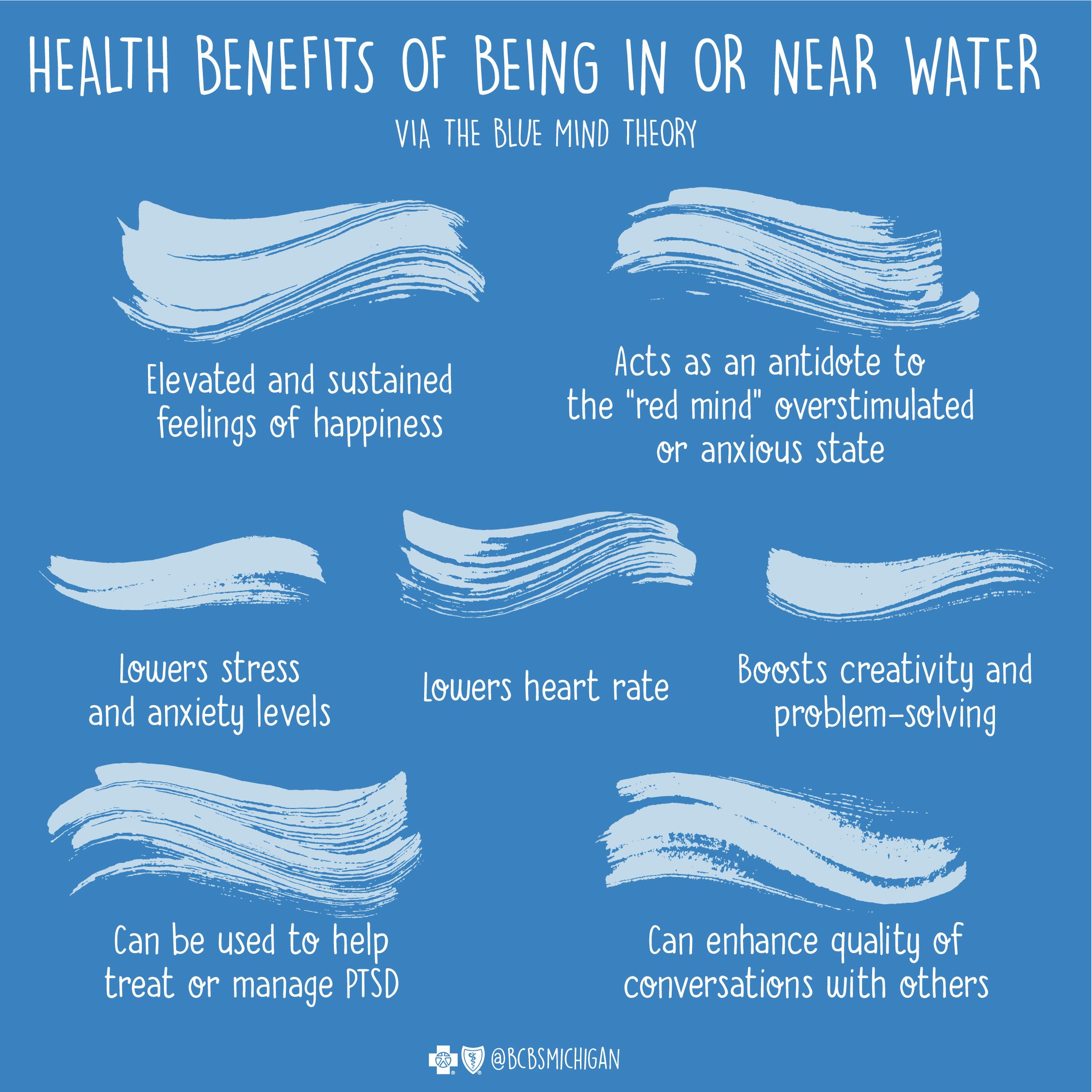Live Blue Blog
Creating words that change minds for good.
Broadly, the topics that interest me are water, wellness and wildlife -- with a healthy dose of wonder in the mix.
Specifically, I'm interested in learning about how others are creating common knowledge and changing conversations - and the world - for good.
Support my work via Patreon, where I actively post updates.
What is Blue Mind Theory?
Posted on Aug 22nd, 2022Thanks to Blue Cross Blue Sheild of Michigan for compiling and sharing the information in this post.
Water in the ocean, rivers, lakes and even baths can make us feel calmer, increase well-being and boost creativity. Blue Mind is the mildly meditative state people fall into when they are near, in, under or on water.
Water positively affects the mind and body, and the Blue Mind Theory provides ways people can use water to improve their well-being.
Blue Mind is the term used to describe the state of water-associated peace. Some of the ways water can produce physical and mental health benefits include:
-
Bodies of water trigger involuntary attention, which is essential to problem-solving and creativity.
-
Water increases the neurotransmitters dopamine, sometimes called the feel-good hormone; serotonin, also known as the happiness hormone; and oxytocin, described as the cuddle hormone; and decreases cortisol, described as the stress hormone.
-
Water is a source of awe that expands a person’s compassion.
-
The color, sound and feel of water can lower pulse rate and increase feelings of calmness.
There are easy ways to experience a blue mind such as:
GO FOR A SWIM
Swimming can have an effect similar to doing yoga, as the deep breathing, gentle movement and stretching all combine to put a person in that mild meditative state.

HAVE A BATH
Immersing in water levels out the sympathetic and parasympathetic nervous systems, which, respectively, control the “fight or flight” response during a threat or perceived danger and the “rest and digest” mode, restoring the body to a state of calm.
GET A FISH TANK OR VISIT AN AQUARIUM
One study found that observing an aquarium for at least 10 minutes can significantly lower blood pressure and heart rate.
DRINK A GLASS OF WATER
Even mild dehydration can have negative effects on a body’s ability to function properly, resulting in higher levels of anxiety and fatigue, while decreasing reaction time and overall ability to focus.
Because water is the major component of most body parts, there are many reasons to stay hydrated, including:
-
Forming saliva for digestion.
-
Keeping mucosal membranes moist.
-
Allowing body cells to grow, reproduce and survive.
-
Flushing body waste, mainly in the urine.
-
Lubricating joints.
-
Helping the brain manufacture hormones and neurotransmitters.
-
Regulating body temperature (sweating and respiration).
-
Acting as a shock absorber for the brain and spinal cord.
-
Converting food to components needed for survival through digestion.
-
Helping deliver oxygen throughout the body.
Learn more about the Blue Theory in this Blue Cross® Virtual Well-Being webinar.You can also sign up for future employer-focused and general interest webinars here, where you’ll find past sessions and resources.
To post a comment, please login.
View this profile on InstagramDr. Wallace J. Nichols (@wallacejnichols) • Instagram photos and videos
What's New
Rochester Women's Magazine
If You Want To Heal, Find Water
Where did our water come from? One theory is from comets and asteroids nearly 4 billion years... continue
New Trader U
The Science Behind The Ocean's Effect On Our Brain
The ocean has long been a source of fascination and wonder for humans. Its vast expanse, rhythmic waves... continue
Red Bull: Understanding the Blue Mind Theory: How water influences our well-being
Read ahead to learn all about this potential mind-body-water connection.
Red Bull surfer Kai Lenny will take any chance he can get to spend time in the sea. &ldquo... continue
